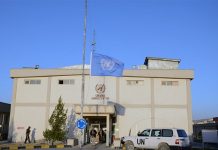An opinion column in Nikkei Asia, the world’s largest business newspaper published on weekly basis in Japan, claimed that China has unveiled an ambitious plan of developing the Karachi port, possibly abandoning the Gwadar port in doing so. The column says that this drastic decision came as a result of the recent episodes of violence where Baloch “pro-independence” groups attacked Chinese workers and engineers throughout Balochistan.
The column, written by Adnan Aamir, a journalist based in Quetta and founder of the Balochistan Voices, an online newspaper, claimed that China has signed a memorandum of understanding with the Karachi Coastal Comprehensive Development Zone project during the recently held 10th Joint Cooperation Committee meeting of the China-Pakistan Economic Corridor.
In this MOU, the author claims, that China is set to spend almost $3.5 billion in developing Karachi port and possibly shifting away from Gwadar as the centre stage of the CPEC. In the project, China will be developing a new fisheries port and a 640-hectare trade zone on the western backwater marshland of the Karachi Port Trust.
Pakistani Prime Minister Imran Khan, hinting at the newfangled project, said that it is a “game-changer.” On Twitter, Khan said: “[This project] will clean up our marine habitat for fishermen, develop [20,000] low-income housing units & present opportunities for investors. Will put [Karachi] at par with developed port cities.”
The columnist goes on to argue that this drastic decision was precipitated by the continuous and frequent attacks targeting Chinese nationals in Balochistan. A suicide attack by the Baloch Liberation Army, an ethno-nationalist armed group embroiled in a long-running insurgency with the Pakistani state, reportedly killed several Chinese engineers working on CPEC projects. In a similar suicide attack in August 2018, a bus carrying Chinese engineers was targeted in the Dalbandin area of Balochistan. Similarly, the Chinese consulate in Karachi and the Chinese-built Pearl Continental, a five-star hotel based in Gwadar, were also attacked the same year. The Pakistan stock exchange in Karachi was also targeted in May 2020. All these attacks were carried out by Baloch insurgents who claim that China is abetting Pakistan in its “genocide” of the Baloch nation.
The author also quotes Malik Siraj Akbar, a Baloch journalist, researcher and author based in Washington, that relative to Gwadar, Karachi offers better infrastructure, stability and a sustainable law and order for the Chinese. “The Chinese want CPEC to leave its mark as a symbol of rising Chinese power without particular interests in any specific region in Pakistan.”
Even though the rumour has spread like wildfire on social media and took many by surprise, neither the Pakistani officials nor their Chinese counterparts have commented on the news yet. It is yet to be seen whether China abandons its ambitions in Gwadar and refocuses its efforts in developing the Karachi port if the project stays the way it is.




























